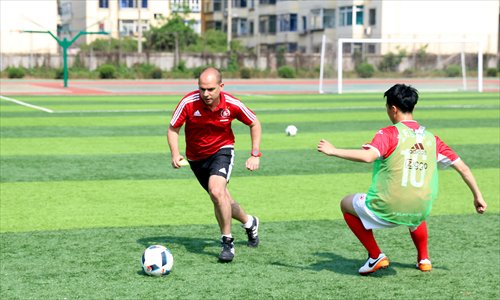HOME >> CHINA
Missing the goal
By Ding Xuezhen Source:Global Times Published: 2016-5-29 19:33:01
Experts argue all-foreigner teams are not what’s needed to develop soccer

A coach (left) from Dutch soccer club AFC Ajax teaches players from the Shenyang Middle School of Hui Nationality on May 19. Photos: CFP
An amateur college league soccer match between a team of Chinese students and a team of Africans studying in China that ended in a crushing defeat for the Asian side has sparked discussions over the state of college soccer in the country.
In Xi'an, Northwest China's Shaannxi Province on May 22, the Xi'an Physical Education University team was drubbed 8-0 by the Xidian University team, which is made up of 11 students from various African nations, news portal ifeng.com reported.
The match showed that "China still lags behind in terms of the popularity and amateur level of soccer," Liu Xiaoxin, chief editor of the Guangzhou-based newspaper Soccer News, told the Global Times.
Despite some positive remarks about cross-cultural exchanges on the pitch, the match also led people to wonder if the managers of the league's teams should take winning matches as their sole goal.
Red card
"It seems as if the (Xidian) team won the match just by getting 11 foreign players," Ma Dexing, deputy editor of Changsha-based magazine Titan Sports, told the Global Times.
Ma argued that colleges winning matches by using only foreign players does not help them with their supposed goal of promoting the sport of soccer among Chinese students.
The Xidian team is not the only side in the league that is completely made up of foreign students. Also on May 22, the all-Chinese team from Xi'an Technological University lost to the all-foreigner team from Northwestern Polytechnical University 1-6.
This shows that some colleges' only goal in their sports programs is to win matches, which does not conform to the original objective of the league, although it is not against the rules, Ma added.
When reached by the Global Times, Ma was in South Korea covering the 44th Asian Schools Football U-18 Championship. China sent a team made up of 20 students from five high schools across the country. On Sunday, the Chinese team finished runners-up after losing the final match to South Korea 0-3. The last time a Chinese team won this championship was in 2003 in Kunming, Yunnan Province.
The amateur league in question has no restrictions upon the nationality or ethnicity of players, according to the ifeng.com report.
Although foreign students should be allowed to play college football, rules should be made to limit the total number of foreign players registered and the number allowed to play simultaneously, Ma suggested.
Spreading soccer
With more and more international students coming to China, it makes sense that increasing numbers of foreign players are taking part in Chinese amateur football matches, Liu said.
The number of international students receiving higher education in China was 356,499 during the the 2013-14 term, an increase of 8.6 percent compared with the previous year, according to data released by the Center for China and Globalization (CCG), a Beijing-based think tank.
In 2014, China became the third-most popular nation among international students, with 8 percent of the world's international students choosing to study in China, according to CCG.
However, Wang Qi, an insider from the football industry, called it "a good thing."
Wang told the Global Times that more international students playing soccer on China's campuses contributes to the diversity of the soccer culture in universities and colleges, citing the various football styles common in different continents.
As a result, it may help expand the number of soccer players on campus, a lack of which is "the most vital issue in promoting the sport in China," said Wang, who is also the former leader of a Beijing-based football team consisting of Chinese celebrities.
In the education system, the number of students playing soccer drops dramatically in high schools and remains small during universities, according to Wang.
China, which has long been an Olympic powerhouse, has vowed a national effort to push forward soccer development as its national soccer team has failed to do well for over a decade.
In December 2015, the Ministry of Education said in a circular touching upon college admission of arts and sport talents in 2016 that universities and colleges will be encouraged to build high-level soccer teams.
In early January, Peking University for the first time announced it would include football talents in its enrolment plan for sportspeople, under which talented players will be offered favorable admission policies, such as a lower score of the college entrance examinations, the Beijing Times reported.
It's good to see that many Chinese universities have adopted admission policies favorable to young soccer players, as it may help boost the popularity of soccer on college campuses and high schools, Wang noted.
Posted in: Society